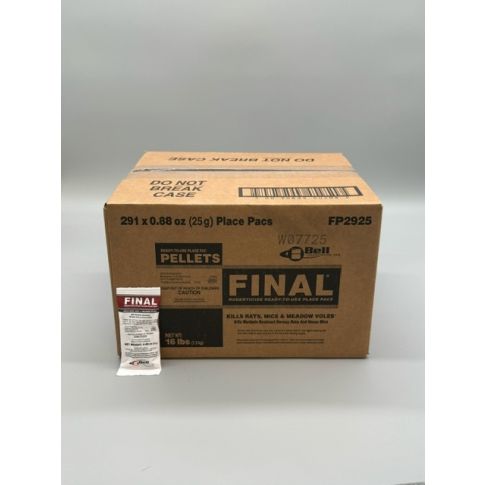Be the first to review this product
FINAL PELLET 291 x 25 gm PKTS/CS
Final Place Pacs are a pelleted bait containing the powerful active ingredient, Brodifacoum, the strongest, single-feeding anticoagulant bait on the market today. Effective on both rats and mice, Final Place Pacs works especially well to clean out persistent mouse infestations where control is difficult or resistance is suspected.
Final Place Pacs are manufactured from an advanced formulation that produces a fresh tasting, highly compressed pellet, noted for outstanding flavor and a long shelf life. Pellets hold up well in adverse conditions, making them a popular choice in moist conditions. The hardness of the pellet also satisfies the rodent's desire to gnaw.
| Size | 291 x 25 gm PKTS / CASE |
| Manufacturer | BELL LABS [view products, website] |
| EPA# | 12455-91 |
| Active Ingredient | Brodifacoum |
| Label | belfp2925_final_pellet_place_paks_label_06122019.pdf |
| SDS | belfp2925_final_pellet_place_paks_sds_06122019.pdf |
| Chemical Classes | Anticoagulant |
| Target Pests | House Mice, Norway Rats, Roof Rats |
| Use | Residential, commercial, or industrial buildings, indoors and outdoors. |
| Application | All redenticides shuold be placed ina Bell Labs tamper-resistant bait station. RATS: Apply 3 to 16 ounces of bait (usually at intervals of 15 to 30 feet) per placement. MICE: Apply 1/4 to 1/2 oz. (1 - 2 level tablespoons) of bait per placement at 8 to 12 foot intervals. Larger placements (up to 2 oz.) may be needed at points of very high mouse activity. |
| No Web orders to | AK, CA, HI, PR, SC, NON U S LOCATIONS |
| Coverage Area | All bait placements must be inside or within 50 feet of buildings. |
| Yield | Each pail contains 291 - 25 gram packets |
SELECTION OF TREATMENT AREAS: Determine areas where rats or mice will most likely find and consume the bait. Generally, these areas are along walls, by gnawed openings, in or beside burrows, in corners and concealed places, between floors and walls, or in locations where rodents or their signs have been seen. Protect bait from rain and snow. Remove as much alternative food as possible.
APPLICATION DIRECTIONS:
RAT CONTROL: Apply 3 to 16 ounces of bait (usually at intervals of 15 to 30 feet) per placement. Maintain an uninterrupted supply of fresh bait for at least 10 days or until signs of rat activity cease.
MOUSE CONTROL: Apply 1/4 to 1/2 oz. (1 - 2 level tablespoons) of bait per placement at 8 to 12 foot intervals. Larger placements (up to 2 oz.) may be needed at points of very high mouse activity. Maintain an uninterrupted supply of fresh bait for at least 15 days or until signs of mouse activity cease.
FOLLOW-UP: Replace contaminated or spoiled bait immediately. Collect and dispose of all dead, exposed animals and leftover bait. To prevent reinfestation, limit sources of rodent food, water, and harborage as much as possible. If reinfestation does occur, repeat treatment. Where a continuous source of infestation is present, establish permanent bait stations and replenish as needed.
IMPORTANT: Do not expose children, pets, or nontarget animals to rodenticides. To help to prevent accidents:
1. Store unused product out of reach of children and pets.
2. Apply bait in locations out of reach of children, pets, domestic animals and nontarget wildlife, or in tamperresistant bait stations. These stations must be resistant to destruction by dogs and by children under six years of age, and must be used in a manner that prevents such children from reaching into bait compartments and obtaining bait. If bait can be shaken from bait stations when they are lifted, units must be secured or otherwise immobilized. Stronger bait stations are needed in areas open to hoofed livestock, raccoons, bears, or other potentially destructive animals, or in areas prone to vandalism.
3. Dispose of product container and unused, spoiled, or unconsumed bait as specified on this label.
Refer to the Product Label for additional baiting instructions and approved application sites.
SELECTION OF TREATMENT AREAS: Determine areas where rats or mice will most likely find and consume the bait. Generally, these areas are along walls, by gnawed openings, in or beside burrows, in corners and concealed places, between floors and walls, or in locations where rodents or their signs have been seen. Protect bait from rain and snow. Remove as much alternative food as possible.
APPLICATION DIRECTIONS:
RAT CONTROL: Apply 3 to 16 ounces of bait (usually at intervals of 15 to 30 feet) per placement. Maintain an uninterrupted supply of fresh bait for at least 10 days or until signs of rat activity cease.
MOUSE CONTROL: Apply 1/4 to 1/2 oz. (1 - 2 level tablespoons) of bait per placement at 8 to 12 foot intervals. Larger placements (up to 2 oz.) may be needed at points of very high mouse activity. Maintain an uninterrupted supply of fresh bait for at least 15 days or until signs of mouse activity cease.
FOLLOW-UP: Replace contaminated or spoiled bait immediately. Collect and dispose of all dead, exposed animals and leftover bait. To prevent reinfestation, limit sources of rodent food, water, and harborage as much as possible. If reinfestation does occur, repeat treatment. Where a continuous source of infestation is present, establish permanent bait stations and replenish as needed.
IMPORTANT: Do not expose children, pets, or nontarget animals to rodenticides. To help to prevent accidents:
1. Store unused product out of reach of children and pets.
2. Apply bait in locations out of reach of children, pets, domestic animals and nontarget wildlife, or in tamperresistant bait stations. These stations must be resistant to destruction by dogs and by children under six years of age, and must be used in a manner that prevents such children from reaching into bait compartments and obtaining bait. If bait can be shaken from bait stations when they are lifted, units must be secured or otherwise immobilized. Stronger bait stations are needed in areas open to hoofed livestock, raccoons, bears, or other potentially destructive animals, or in areas prone to vandalism.
3. Dispose of product container and unused, spoiled, or unconsumed bait as specified on this label.
Refer to the Product Label for additional baiting instructions and approved application sites.

